Editor's Rating
Introduction
The Orient Ray II, along with it’s sister model the Mako II, is always on the short list of recommended first automatic watches for people just starting to get into watch collecting.
It’s main competitor for first time buyers money is mainly the Seiko SKX007, which I’ve already reviewed and owned for the last couple of years. I’ve been wearing the Ray II for the last 6 or so months as my main beater watch, and finally feel ready to get my thoughts down.
This article contains affiliate links. As an Amazon Associate, I earn commission from qualifying purchases.
Orient Watch
Orient Watch, founded in 1950, is a Japanese company known for being one of the few low to mid range watch companies that still manufacture their own automatic movements. They’ve taken the world by storm, producing over 1.1 million watch movements every year.
Now partly owned by Seiko, they seem to have maintained their own identity very well, producing watches that cover the whole range from luxury to dive, from low-end to high-end.
Orient Ray II Specifications
Specifications
- Orient caliber F6922 automatic movement
- Hand winding and hacking seconds
- 40 hour power reserve
- 120 click unidirectional stainless steel diver’s bezel
- 200 meter (660 feet) water resistance
- Screw-down crown and screw-lock caseback
- Mineral crystal
- Stainless steel case and bracelet
- 41.5mm diameter
- 22mm lug width
- 13mm height
The Ray II is available with either a black dial (FAA02004B9), a blue dial (FAA02005D9, the piece I have), or as the ‘Ray Raven II’ – with a blacked stainless steel case (FAA02003B9).
Orient Ray II Diver’s Watch Review
With all the specifications and history out of the way, let’s get into the watch I have here and have been wearing for the last half year.
And a note before I jump into this review – I’m not very careful with my watches, and this Ray II has been with me for such varied activities as kayak and SCUBA guiding, working on boat engines, and wood working. If you look closely you’ll see a few nicks, but I think the Ray has held up very well. All of the photos in this review are from a watch worn for several months, not one fresh out of the box.
Dial
This is probably my favorite part of the Ray II. The deep blue dial features a lovely reflective star-burst patterned background (only just barely shows up in pictures), applied indices, a framed day/date window, and minimal text.
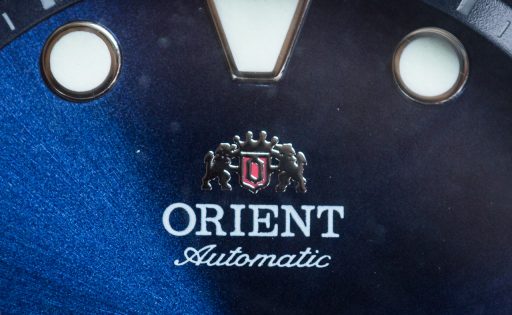
The Orient logo (two lions either side of an ‘O’ shield) sits just below the 12 o’clock index. Looking around online, many people dislike this logo, calling it ‘cheap and pretentious‘. In my humble opinion, it looks just fine. It’s small and tastefully done.

The only other text on the dial is at 6 o’clock, notifying the water resistance (200 meters) and where the movement was made.
Date Window

The date window sits at 3 o’clock. Unlike the simple cutout on the SKX007, the Ray II’s date window is beveled and framed in chrome. The text for the day and date is sharply printed, and the day can be set to read in either English or Spanish. It’s all black text, except for Sunday which is printed in red.
Handset
A pair of clean-cut swords make up the minute and hour hands. The second hand is a red-tipped arrow and features a small chromed counterbalance. The in-house F6922 movement ticks over at 3 times a second, leading to a decently smooth sweep.
Bezel
The thin, scalloped-edge unidirectional diver’s bezel is marked with a round luminescent pip at the 12 o’clock, minute marks for the first 15 minutes, and marked every 5 minutes after that with either a bar or the numerals. It holds position very well, with only a slight wiggle when forced, and a nice solid clicking when turned.
A number of reviews I’ve read about the original Mako & Ray was that the bezel was incredibly difficult to turn, especially with wet hands. As I mentioned in my review of the Seiko SKX007, that was one of the main reasons I had bought a SKX first. I’m glad to report that this is not the case with the Orient Ray II. It turns easily, and I’ve had no problems setting it while wearing heavy cold-water diving gloves.
Case
Smooth, flowing lines define the stainless steel case of the Orient Ray II. The shape is simple – crown & crown guards at 3 o’clock and short, slightly curved lugs built on a circular center.
The left side of the case is featureless, with the lugs blending into the main case and back into each other. The top and bottom of the case are rounded off, blending into the bezel on the top and the case-back on the bottom.
Between the lugs are standard, thin spring bars. You can see where the bottom of the case between the lugs has a slight cut-in, which helps slipping NATO-style straps in.
Case Back
Looking at the backside of the Ray II you can see the pretty standard screw-down case back. It features a pair of engraved dolphins circling each other, with ‘200’ etched below them, signifying the depth rating of the watch. Above the dolphins is the Orient logo. The engraving is shallow, but still looks much better than a printed design and will hold up much better.
Crown
The crown is engraved with the Orient crest, which is a nice touch. It’s well protected between two substantial crown guards, but still easy to hold and operate.
Operation is pretty standard – after unscrewing the crown you can turn it to wind the watch. With a gentle pull out it’ll click into the day/date setting, turning one way will advance day and the other way will advance the date. One more click out allows you to set the hands. Since the Ray II’s movement features hacking seconds the seconds hand will stop once you pull out the crown, allowing for very accurate setting.
Bracelet
The stock stainless steel bracelet is low-end but still looks nice. The hollow end links feel cheap when you’re working on taking the bracelet off or putting it on, but they sit well against the case and you don’t notice while wearing. Most of the bracelet has a brushed finish, but the center has two lines of polishing running down it that add a lot of visual interest.
I’ve got relatively small wrists and had to pull out a few links for it to fit properly. Adjusting is easy, with pins that just need pushed out, instead of small screws.
For a really good bracelet upgrade, check out my review of the Strapcode endmill bracelet on the Orient Ray II.
Strap options
Most of my wrist time with the Orient Ray II has been on a simple black nylon NATO strap. I work with my hands a lot and don’t tend to like the weight of the bracelet. NATO straps are light weight and comfortable. It’s also much better for diving with than the bracelet!
The Ray II also looks pretty good on a leather strap, but since I’m on the water a lot my leather straps don’t tend to get worn much.
Size Comparison
Here I’ve got the Ray II sitting between the Seiko SKX007 and the Casio MDV106. You can tell the Orient Ray II is about the same size as the SKX007, and a few millimeters smaller than the Casio.
Diving with the Ray II
Over this last summer I’ve taken the Orient Ray II diving quite a few times. Needless to say, it’s held up great, with no signs of water ingress. The deepest depth I’ve taken it to would be about 100 feet or 30 meters, no where near it’s depth rating of 200 meters.
The bezel is easy to set while wearing the thick gloves required in my cold local waters. The dial and handset are easy to see, and it takes no time at all to check the elapsed dive time. The lume on the hands and dial also stays nice and bright for the length of an hour long dive if given a good charge with a dive light at the start.
Even though I always dive with a dive computer I find I have an easier time just looking at my watch if all I want to know is how long I’ve been under or what the current time is.
Orient Ray II Review Conclusion
Want an inexpensive mechanical diver that can take a beating while still looking good?
Buy the Orient Ray II (or Mako II)!
The main things that have made me keep coming back to this watch over others in it’s price range are the dial design, hacking & hand-winding movement, and the ease of bezel operation.
You won’t regret picking one of these up. And even if you did, you could probably resell it for close to what you got it for.








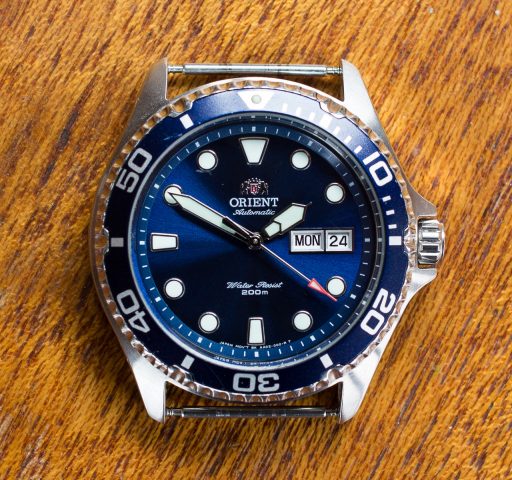


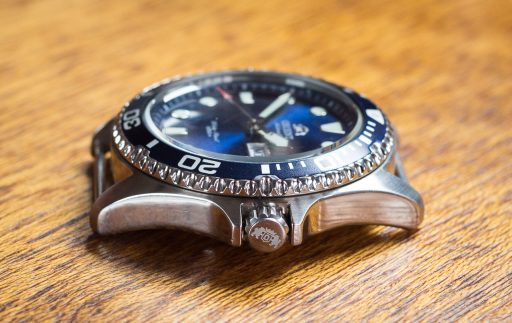
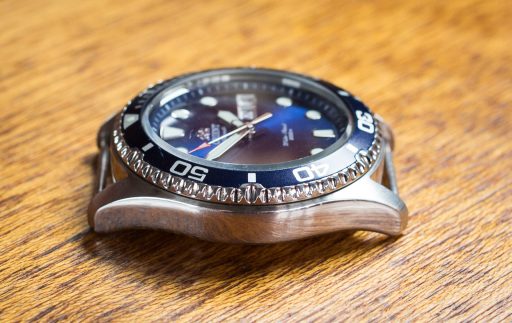
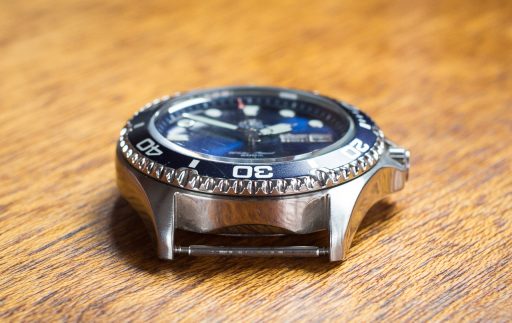





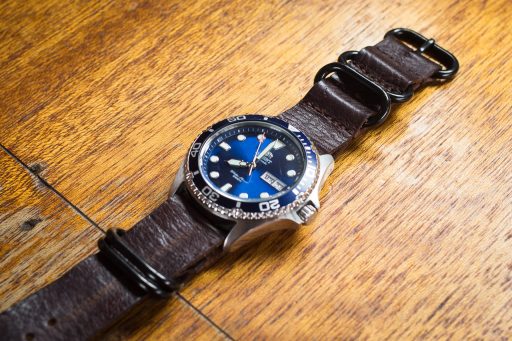
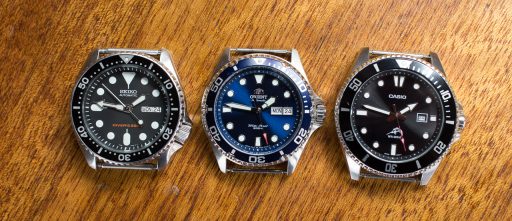


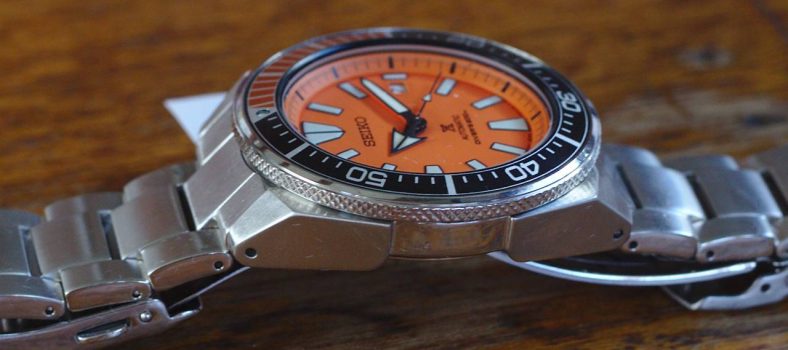
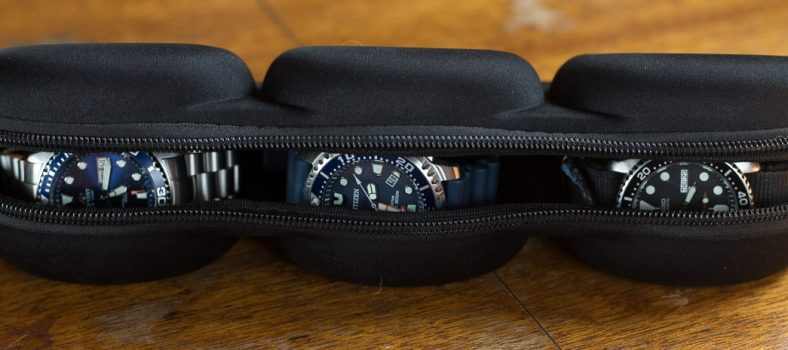
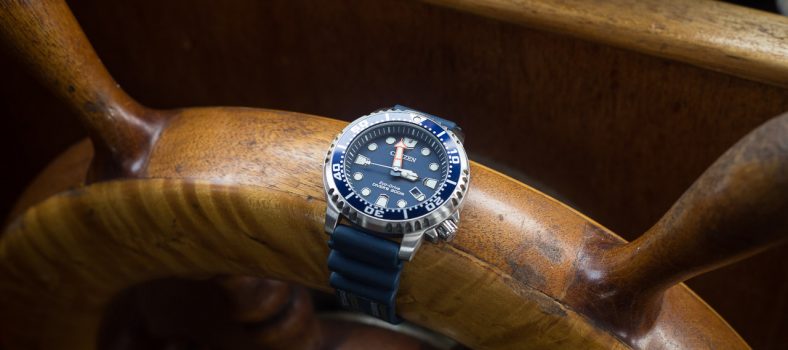
4 Comments
Awesomen review, i just consider bout the crystal used in blue ray which is mineral crystal. I have a plan to buy this watch but that thing bother me a lot. Can you tell me bout the diameter of dial on blue ray ? On mm? Maybe i will order dome sapphire crystal to solve it. Thx for you answer and help.
Now, this is is the kind of review I like! Worn for half a year and the watch being used for what it was intended. I am amazed how good this workhorse looks after all this.
Thanks Harry! I keep telling myself I’m going to buy a watch, wear it for a couple weeks, write a review and then sell it on so that I can get more reviews up. It never happens though. I’ve had my Seiko Turtle for over 6 months now and still haven’t gotten a review up…
I am glad you didn’t Reed! Too many people allready wear a warch for a short time and then review it. What you do is a niche, really special! And a nerd like me is very interested in how (dive-)watches keep up in actual use for a longer time. Keep up the good work!
I am looking forward to your review of the Turtle. I own the new one as well as the older 6309.